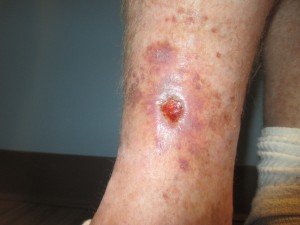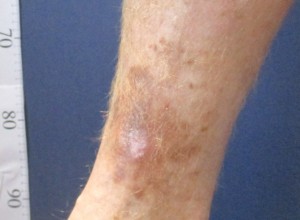
Venous Insufficiency Ulcers
The most severe stage of venous disease can result in open, non-healing sores called venous ulcers. They might also be referred to as venous insufficiency ulcers or venous stasis ulcers. Venous ulcers most often occur on the ankle and shin area. They rarely occur above the knee.
Venous ulcers can range in size from small to quite large. They can take months or even years to heal. Healing is a gradual process that typically results in shiny, pink or red scar with distinct white marks. Venous ulcers can come back even after healing.
A venous ulcer is a serious condition that should be treated immediately.
What Do Venous Stasis Ulcers Look Like?
Venous insufficiency ulcers and venous stasis ulcers have an appearance that is easy to recognize:
- Typically shallow
- Appear red at the bottom
- Sometimes painful and tender to the touch
- May ooze or drain fluid; the amount depends on the size and severity of the ulcer
- Start small but can become quite large
- Multiple ulcers can occur at the same time
Where do Venous Insufficiency Ulcers Form?
Venous ulcers most commonly form low on the inner ankle area. They can also occur on the outer ankle area and in the shin area. Rarely do venous ulcers form above the knee. When they do occur above the knee they are often the result of injury or trauma, frequently from repeated scratching.
 What Causes Venous Insufficiency Ulcers?
What Causes Venous Insufficiency Ulcers?
Venous ulcers, also called venous insufficiency ulcers or venous stasis ulcers, represent the most severe stage of venous reflux, a condition in which blood flows backwards through veins and pools.
In normal veins, one-way valves control the proper flow of blood. In veins suffering from venous reflux, these valves become damaged and fail to work properly, a condition called valvular incompetence. Varicose veins demonstrate venous reflux from abnormalities in the vein wall, valvular incompetence, or both.
Earlier stages of venous reflux can result in spider veins or varicose veins. More advanced stages can result in skin discoloration, swelling legs, and venous ulcers.
Generally, all stages of venous disease can be influenced by many contributing factors:
- Genetics — Statistically, the most important factor for determining venous disease
- Gender — Women are more susceptible to venous disease than men
- Pregnancy — Elevated blood volume, hormone levels and pressure on the leg veins due to an enlarging uterus
- Obesity or weight gain — Excessive weight accelerates the progression of varicose veins and other manifestations of chronic venous disease
- Surgery or injury (especially near the pelvis) — Blood flow in damaged veins can be restricted
- Prolonged standing or sitting — Sedentary lifestyles and certain occupations can lead to inactivity in the muscles that help with blood flow
- Blood clot — Inside veins, clots can form that block the flow of blood
Venous Insufficiency Ulcers: Signs and Symptoms
Venous ulcers are non-healing, open sores normally located on the ankle or shin areas. They are often shallow with a red appearance at the bottom, may be painful and tender to the touch, and may ooze or drain fluid in small to large amounts.
Treatment for Venous Insufficiency Ulcers
Because venous ulcers represent the most advanced stage of venous reflux, our doctors will treat the disease with the most progressive therapy possible:
- An initial diagnostic ultrasound will precisely locate damaged veins and measure the extent of the disease
- Typically, treatment includes compression therapy and the closing of refluxing veins with venous ablation and/or foam sclerotherapy
Have Questions?
You can read more about endovenous ablation in our FAQ. For more information about VasCare and how we can help you, contact us or call our offices at:
Beaumont Clinic – 409.924.8600
Corpus Christi Clinic – 361.882.4000

